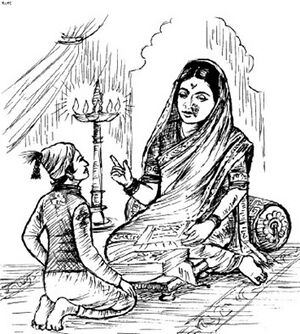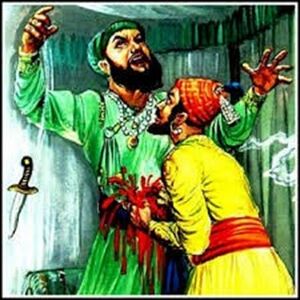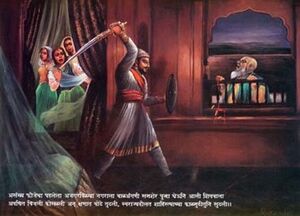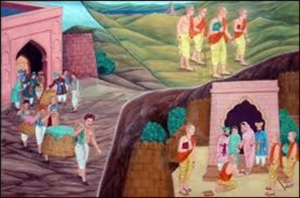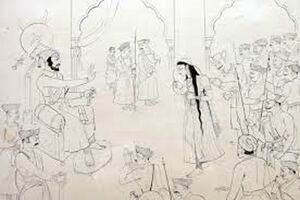Talk:Chhatrapati Śivājī and his Guru Swāmī Samartha Rāmadāsa
By Vishal Agarwal
After Aurangzeb became the sixth Mughal Emperor of India in 1658 CE, he started persecuting the Hindus, who were over 80% of the population of the Indian subcontinent. He broke numerous temples, slaughtered cows and Brāhmaṇas, forcibly converted thousands, prohibited public celebration of Hindu festivals, indulged in burning of Hindu scriptures, imposed taxes like the temple entry tax, the pilgrimage tax and the Jaziya on the Hindus, fired Hindu employees from administration and so on. As a result, groups of Hindus rose in revolt. In peninsular India, Hindu revolts were led by Chhatrapati Śivājī, who rallied the brave Marāṭhā warriors and started freeing territory that was under the rule of Aurangzeb. Among other teachers, Śivājī was also guided by the Hindu Saint Svāmī Samartha Rāmadāsa.
The childhood of Śivājī: Śivājī was born to Śāhajī Bhoṃsale and Jījābāī. Śāhajī served the Muslim rulers of western India. When Śivājī was still a child, Śāhajī sent him with his mother and a learned Brāhmaṇa named Dādājī Koṇḍadeva to Pune. Śivājī heard the stories of the brave heroes of the Rāmāyaṇa and the Mahābhārata as he grew up from his mother, and Dādā Koṇḍadeva.
Jījābāī was pained that most of India was ruled by Muslim rulers who frequently insulted the religion of the Hindus. She did not like the fact that her own husband served one of them – the Sulṭān of Bijāpura. Therefore she taught Śivājī that he must be patriotic and free the land from their rule one day. Śivājī took to his heart the teachings of his mother and Dādā Koṇḍadeva.
Śivājī creates a Hindu Kingdom and kills Afẓal Khān:
He gathered a group of Marāṭhā Hindu boys and together, they started training for military battles. Soon, Śivājī and his soldiers captured the fort of Toranā. When the Sulṭān of Bijāpura heard the news, he sent his seven-foot-tall general named Afẓal Khān to capture Śivājī. Afẓal Khān arrived with a large force. On his way to Pune, he demolished many Hindu temples and killed innocent people. Śivājī sent him a message, “You are like a father to me. I want to come and meet with you to offer my respects. But my condition is that both of us will come to meet without our armies. Only two body-guards will come with each of us.” Afẓal Khān thought that this was a good opportunity to kill Śivājī, who was a very small man compared to him.
When Śivājī met Afẓal Khān, he came forward to give a hug to Śivājī in a fake show of love. In reality, he had a dagger in the arm that went behind Śivājī’s back, and wanted to stab Śivājī to death. But Śivājī was smarter. He had come with an armor jacket hidden under his clothing. Moreover, on his fingers, he wore metal claws. Afẓal Khān’s dagger could not pierce Śivājī’s back, but Śivājī dug his metal claws into Afẓal Khān’s stomach and killed him. Śivājī’s body-guards were expert swordsmen and they killed Afẓal Khān’s guards.
Śivājī injures Śāistā Khān:
After this success, Śivājī and his soldiers captured one fort after another in western India. The common man in Śivājī’s kingdom was very happy, and Hindus were able to practice their dharm peacefully once more. But, Śivājī needed money to run his kingdom. Therefore, he attacked and looted the Indian port of Surata, which was a part of the mighty Mughal empire of Aurangzeb. Śivājī took care that the common citizens of Surata were not harmed during his raid. Emperor Aurangzeb was furious at the news, and he sent a huge army under his uncle Śāistā Khān to kill Śivājī. Śāistā Khān easily captured Pune, and occupied the palace of Śivājī while he was away.
Śivājī thought of a plan. He and his soldiers dressed as members of a wedding procession which then passed outside Śivājī’s palace. They slipped into the palace, shocking Śāistā Khān, who tried to escape in the confusion. However, Śivājī cut his fingers as Śāistā Khān fled from the palace, leaving his guards and family behind. When Śāistā Khān reached the court of Aurangzeb, the Mughal Emperor was furious at Śivājī’s boldness.
This time, he sent a mighty army under the leadership of a Rājpūt Hindu ruler named Jai Siṃha. Śivājī wrote a letter to Jai Siṃha shaming him for serving a Muslim ruler who insulted Hindu dharm, the faith of Jai Siṃha. But, the Rājpūt chief did not listen and the army led by him defeated Śivājī and captured him. Śivājī was produced before Aurangzeb in his court, but the Emperor ignored him. Śivājī insulted Aurangzeb in front of everyone, as a result of which, Aurangzeb put him under house arrest in the city of Āgrā.
Śivājī escapes from Aurangzeb’s arrest:
While under house-arrest, Śivājī pretended that he had fallen sick. He expressed a wish to send large baskets of gifts to Hindu holy men to get their blessings. Every day, as the baskets left Śivājī’s home, the Mughal guards inspected them carefully, but they found only sweets, flowers, clothing and similar gifts for the Brāhmaṇas. After a while, they stopped checking the baskets.
Taking advantage of the opportunity, Śivājī and his son hid themselves in the baskets one day and slipped out! At a distance, a supporter of Śivājī waited with clothes and horses. Śivājī, his son and the supporter disguised themselves as wandering Sādhus. They traveled from one place to another in this disguise to prevent being arrested by Aurangzeb’s soldiers.
Śivājī crowned as a Hindu Emperor:
Finally, after roaming through central India, Śivājī reached Rājgaḍha and surprised his mother. Preparations were made to crown him as a Hindu Emperor. However, as Śivājī was from a humble family, some close-minded Paṇḍits refused to bless him. Thereupon, the Hindu king of Udaipur declared Śivājī as his adopted son, and a learned Brāhmaṇa from Vārāṇasī agreed to perform the ceremonies to crown Śivājī as a Hindu emperor.
All over India, Hindus were filled with pride. Now, they could look up to a leader who would free them from the harsh rule of Aurangzeb. One by one, Śivājī set about capturing the forts of Aurangzeb in western and southern India. But his struggle was not very easy because the Mughal army was much larger than his. A story below is sometimes told of how Śivājī developed a successful strategy to defeat Aurangzeb.
How Śivājī captured the forts of Emperor Aurangzeb:
Initially, Śivājī had great difficulty in capturing the forts held by Aurangzeb. One day, after a war, he was passing through a jungle, hungry, tired and separated from his soldiers. He came across a hut, and requested the old lady inside it for some food. The lady thought him to be a soldier in Śivājī’s army. She quickly served him some steaming hot food.
Śivājī was very hungry and he immediately plunged his fingers into the middle of the food pile and gulped it down. In doing so, he burned both his fingers and his mouth. The old lady remarked amusingly, “You too are foolish like Śivājī!”
Startled, Śivājī asked, “Dear Mother, please explain why you think of Śivājī as foolish?” The lady replied, “Look at you – instead of trying to nibble at cooler food at the edges, you plunged straight into the center of the hot pile of food. Similarly, Śivājī attacks big forts at the center of the Empire of Aurangzeb, and then gets defeated and suffers heavy losses every now and then. Instead, he should attack the small forts in the border areas of the Mughal empire and capture them one by one. This way, he will constantly increase his strength, and can then easily capture the bigger forts at the center.”
Śivājī admired the intelligence of his host. He adopted her strategy and as a result, he was able to establish a large kingdom before he died.
During the Muslim rule in India, the rulers and chiefs frequently kidnapped beautiful Hindu women for their use. Śivājī started liberating the western parts of India from the Mughal empire and established a just Hindu rule. Some of his soldiers captured the beautiful daughter of the Amīr of the town of Kalyāṇa, and presented her to Śivājī. They thought that Śivājī would get even with the Muslims and force her into becoming his bride.
But Śivājī looked at the terrified lady and then commented, “If my mother were as beautiful as her, I too would have been a handsome man. I order that she be returned to her family with full honors.”

